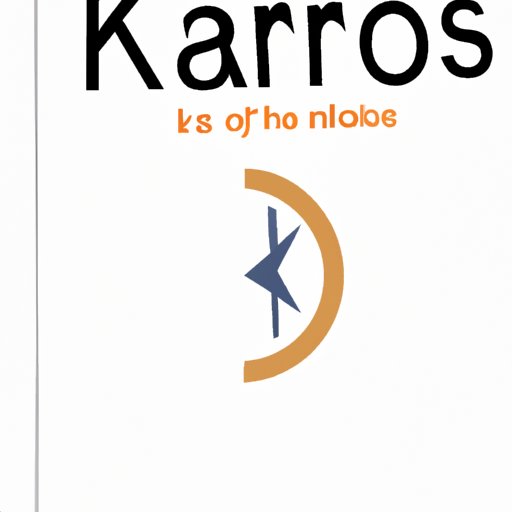Introduction
Kairos is a Greek word that has been used throughout the centuries to describe the perfect moment for something to occur. In literature, this concept is used to refer to the timing of events or the ideal opportunity to take advantage of a situation. By understanding the meaning of kairos in literature, authors can create powerful stories and poems that captivate readers.

Exploring the Meaning of Kairos in Literature
What is kairos? The term originates from ancient Greek and is defined as “the right or opportune moment.” In literature, kairos is used to refer to the concept of timing and opportunity and how they can affect the outcome of a story or poem. It is often used to emphasize certain moments in a narrative and add tension or suspense to the work.
Examples of kairos in literature can be found in works such as Homer’s Odyssey and Shakespeare’s Romeo and Juliet. In both of these works, kairos is used to illustrate the importance of timing in achieving a successful outcome. For example, in Romeo and Juliet, the characters must make haste in order to achieve their goal of being together before it is too late. In the Odyssey, Odysseus’ journey is filled with obstacles that require him to take advantage of opportunities as they arise.
The role of kairos in fiction and poetry is to highlight the significance of timing and opportunity in achieving success. By emphasizing these key aspects of a story or poem, authors are able to create powerful works of art that capture the attention of readers. Furthermore, by using kairos effectively, authors can create tension and suspense that keeps readers engaged until the very end.

A Look Into the Role of Kairos in Literary Works
How authors use kairos to enhance their writing varies depending on the type of work. In fiction, kairos may be used to show how a character’s decisions have a direct impact on the outcome of the story. For example, in Harper Lee’s To Kill a Mockingbird, Atticus Finch’s decision to defend Tom Robinson is an example of kairos because it is the perfect opportunity for him to demonstrate his values and beliefs. Similarly, in Ernest Hemingway’s The Sun Also Rises, Jake Barnes’ decision to leave Lady Brett Ashley is an example of kairos because it is the right moment for him to take control of his own destiny.
In poetry, kairos may be used to emphasize certain moments in a poem and create tension or suspense. For instance, in Robert Frost’s “The Road Not Taken,” the speaker’s decision to take the road less traveled is an example of kairos because it is the perfect moment for him to make a life-changing decision. Similarly, in Emily Dickinson’s “Hope is the Thing With Feathers,” the speaker’s decision to remain hopeful despite adversity is an example of kairos because it is the right opportunity to show resilience in the face of difficulty.
Unpacking the Concept of Kairos in Fiction and Poetry
The power of kairos lies in its ability to emphasize important moments in a story or poem. By focusing on the timing of events or the ideal opportunity to take advantage of a situation, authors can create powerful works of art that captivate readers. Furthermore, by using kairos effectively, authors can create tension and suspense that keeps readers engaged until the very end.
Examples of kairos in fiction and poetry can be found in works such as Homer’s Odyssey, Harper Lee’s To Kill a Mockingbird, Ernest Hemingway’s The Sun Also Rises, Robert Frost’s “The Road Not Taken” and Emily Dickinson’s “Hope is the Thing With Feathers.” In each of these works, kairos is used to emphasize certain moments in a narrative and add tension or suspense to the work.
Conclusion
Kairos is an important concept in literature that is used to emphasize the significance of timing and opportunity. By understanding the meaning of kairos in literature, authors can create powerful stories and poems that captivate readers. Examples of kairos in fiction and poetry can be found in works such as Homer’s Odyssey, Harper Lee’s To Kill a Mockingbird, Ernest Hemingway’s The Sun Also Rises, Robert Frost’s “The Road Not Taken” and Emily Dickinson’s “Hope is the Thing With Feathers.”
The power of kairos lies in its ability to highlight important moments in a story or poem. By emphasizing the timing of events or the ideal opportunity to take advantage of a situation, authors can create powerful works of art that captivate readers. Furthermore, by using kairos effectively, authors can create tension and suspense that keeps readers engaged until the very end.
In conclusion, kairos is an essential concept in literature that authors can use to enhance their writing. By understanding the meaning of kairos and utilizing it effectively, authors can create powerful stories and poems that captivate readers.
(Note: Is this article not meeting your expectations? Do you have knowledge or insights to share? Unlock new opportunities and expand your reach by joining our authors team. Click Registration to join us and share your expertise with our readers.)
